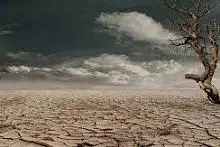In order to know the meaning of the term desertification, it is necessary, first of all, to discover its etymological origin. In this case, we can state that it comes from Latin and that it is the result of the sum of several parts:
-The prefix «de-«, which indicates «from top to bottom».
-The verb «serere», which is synonymous with «interlace».
-The verb "facere", which means "to make".
-The suffix "-cion", which is used to indicate "action and effect."
Desertification is the process and result of desertifying . This verb, for its part, refers to the transformation of fertile land into a desert .
 In other words, desertification means that a land that allowed abundant production becomes, due to various factors, an arid place with little or no vegetation. It is, therefore, an ecological problem.
In other words, desertification means that a land that allowed abundant production becomes, due to various factors, an arid place with little or no vegetation. It is, therefore, an ecological problem.
Desertification implies the degradation of fertile soil , which loses its productive capacity. This process may be due to erosion , deforestation , overirrigation, or overexploitation of an aquifer, for example.
The person responsible for desertification is usually man . When a certain piece of land is cultivated without control, excessive grazing or deforestation is carried out, desertification is likely to begin to develop. Over time, this situation can cause problems in obtaining food, since the soils are no longer suitable for cultivation.
In the same way, we can establish that there are other causes of desertification. Thus, for example, among these is poor use of water and soil. By this we mean that the land is irrigated using water that has salts. This action will cause the soil to become salinized while the vegetation will not grow and soil erosion will be greatly encouraged.
Forest fires and massive felling of trees are, likewise, other causes of desertification. Thus, for example, the second brings with it the complete deterioration of the cover that is responsible for protecting the natural environment.
Many times desertification is a consequence of population increase. As the number of inhabitants grows, there is a tendency towards intensive exploitation of the soil to satisfy food needs. This results in the exhaustion of the land and its subsequent desertification: in the absence of vegetation cover, erosion caused by wind and water advances more quickly.
In addition to these consequences of desertification, we cannot forget other important ones such as rural poverty among the population that is dedicated to work related to agriculture and livestock and even migration. This takes place when the lands barely produce and people, especially the youngest, leave to find a better future.
Depending on the level of the decline in agricultural production, desertification can be classified in different ways. The most serious is very severe desertification , when production falls by more than 50% and arid, dry mounds develop on the land.
